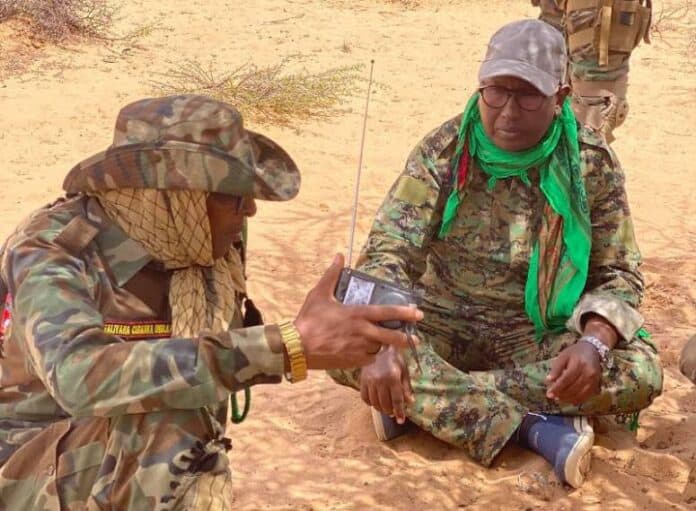Share the post "Corruption and Clannism: The Somali National Security Advisor and the Pursuit of Clan Crusade"
MOGADISHU — In his fifties, Mr. Abdisaid Muse Ali was born in Jowhar, a riverside town and the breadbasket of Somalia’s food-insecure regions. Defined by a tumultuous past, Ali is currently the National Security Advisor to the President, a powerful portfolio underestimated by most presidents in recent history. Skilled in manipulation and an abrasive attitude, Ali has already proven detrimental and a high risk to the security sector and the reform agenda at a critical juncture in the country’s post-conflict recovery…
President Mohamed Abdullahi Farmajo appointed Ali to the post in 2017 despite having no previous experience or qualifications in the security profession. His predecessor, General Ahmed Sheikh Mohamed, was a seasoned former military but was sacked for failing to serve well under Mr. Fahad Yasin, then the Presidency’s chief of staff. Both Yasin and Ali have relations on the maternal side, a nepotism culture prevalent in Farmajo’s administration. As confirmed by insiders, blood relations with Yasin was only necessary to place Ali in that role.
“To understand Abdisaid, you need to know his background and the destructive personal agenda he advances,” said a former colleague of Mr. Ali’s at the Nordic International Support Foundation (NIS Foundation), a Norwegian development agency based in Mogadishu, who asked for anonymity.
War Tragedy
Mr. Ali grew up in Mogadishu but fled during the civil war in 1991. His older brother was killed on the battlefield while fighting against the United Somali Congress in Kismayo, an armed movement against the dictatorial regime. According to a family member interviewed for this investigation, Ali has become bitterly hateful and vengeful towards USC clans, a normal state in the nation’s psyche inherited from the lingering civil war. Contacted for his comments, but Ali didn’t respond to the inquiry.
In Kenya, where he spent as a refugee, Ali developed extreme paranoia and hatred for losing everything to the civil unrest, with much blame to USC affiliated clans. The deplorable conditions in the camp perhaps didn’t help him cope well with the war’s trauma as a young adult. For Ali, this was a defining moment in his life that would negatively shape his outlook and perceptions, particularly to clans he deemed adversarial to his.
His father, Muse Ali, was involved in the Somali Salvation Democratic Front (SSDF) in early 1980’s, an armed guerrilla opposition against the dictatorial regime of Mohamed Siyad Barre. At one time, he was captured by the government at a border town village in northwestern Mudug but was released through an intervention by a man who later became one of General Mohamed F. Aideed’s adamant supporters. “the father was a polarizing man who sees everything through clannish lenses,” said by Mr. Shire Dirie, a long-time family friend to Ali, who has retired in Saudi Arabia.
Survival in the Diaspora
In Europe, Ali rebooted his life in the Netherlands but couldn’t adapt to Dutch culture and language, later deciding to move to North America. But while in the Netherlands, Ali married a young woman that hailed from the same Majerteen subclan. After one child, they later got divorced and she moved to the United Kingdom.
With a Dutch travel document, Ali moved to Dallas, Texas, in the United States early in 1998. After securing an asylee status (I-94) from the U.S., Ali joined the taxi industry immediately, driving for Eagle Cab Company in Dallas. In Dallas, his colleagues contacted for this interview characterized him as a “complainer” and an ‘indolent’ person.
In September 2001, after the Twin Towers attack by Al Qaeda, the transport industry, particularly Texas, became sluggish. According to his friends, that forced Ali to move to Chicago, Illinois in 2002. For many of them, Chicago had better opportunities for Muslims and people of color than Dallas. Again, he applied for a hackney license to drive for the Yellow Cab Company in Chicago.
For several years, Ali strived to make a living from the dangerous nightshifts as he enrolled in a part-time English course as a Second Language (ESL) program at the Malcolm X Community College in Chicago. But this didn’t go well as he dropped out of school and sought opportunity in Somali politics after his uncle, Col. Abdullahi Yusuf Ahmed, was elected as the President of the Transitional Federal Government (TFG).
Return to Mogadishu
Because of his kinship, Ali secured a position as a personal assistant to President Ahmed. The opportunity was a turning point in Ali’s life, which rendered a chance to whisper into the most powerful man’s ears in the government. They both shared the hostility towards Mogadishu’s inhabitants, who harbored the Islamic Courts Union (ICU) leaders for restoring a semblance of law and order in the capital.
In time, President Ahmed, with support from Ethiopia’s late dictator Meles Zenawi, waged a bloody urban war against the ICU, which displaced 1.3 million from the capital. In some credible accounts from rights groups, they estimated that over 10 thousand civilians lost their lives in the conflict.
According to sources interviewed for this investigation, Ali befriended an underage girl in Mogadishu, whom he was later alleged to have raped in Nairobi. Falling in love, Mr. Ali took the girl to Nairobi without the consent of her family. And as reconfirmed by other sources privy to the case, Nairobi was where things took a turn for their ‘relationship’ and the rape of the underage girl took place.
Because of the stigma associated with the heinous act, the family failed to press charges, as he never showed up to hearings of Nairobi’s case. For years, as a result of that, Ali avoided making transit stops at Jomo Kenyatta Airport, fearing an arrest warrant involving his case.
In Mogadishu, Ali amassed wealth extorted from the capital’s business community for protection in which the President has repeatedly accused them of sheltering the insurgency. A former member of the Mogadishu Chamber of Commerce, who was himself a victim, named Ali and confirmed him as the extortion crime ringleader. As indicated by real estate documents reviewed by this author, Ali invested the proceeds in real estate business located in Westland’s, Nairobi, through immediate relatives.
Life as an Informant
Ali took advantage of the connections he made during Abdullahi Yusuf’s administration, mainly from the European donors. As confirmed, his sister introduced him to Alex Rondo, a controversial E.U. ambassador to the Horn of Africa. In time, Rondo has become Ali’s mentor and presented him with key figures and agencies within the intelligence corridors. The mentorship exposed him to useful entities in the region. The clients he freelanced for included Kenya, Ethiopia, and the E.U., providing sources and information about Somali community leaders and politicians across the Horn.
Through these networks, Ali provided consultancy to IGAD through its Center of Excellence in Preventing and Countering Violent Extremism, a portfolio supported by the very EU mission vested in propping Ali’s credentials as an expert. But Ali’s dismal performance in report writing forced him out from working there as a professional consultant.
Clannish Agenda
His position as the National Security Advisor provided him with the ideal cover to pursue his long-held agenda against clans he deemed enemies. This position allowed him to build a spurious image of a reformer, even as he lacked the academic and professional credentials to be taken seriously.
But Ali was driven by an agenda of revenger and with his simmering vengeance, Ali managed to convince Western donors that the Somali National Army (SNA) funding contributes to the human rights abuses against civilian populations in southern Somalia. His cultivated image of a reformer and a technocrat provided a useful mask for his true agenda to scale up in the ranks in the Somali Government and boost his professional portfolio. The move called for an internal investigation, which led to budget cancellations, particularly to crucial SNA brigades, who tackled for many years the threat of Shabaab in both Lower and Middle Shabelle regions.
His argument espouses views specific to Puntland politicians, that SNA reflects Hawiye more than other clans, which ignores the unadulterated composition of Puntland forces in the north. The clan narrative he spewed later found champions within the UN circles, publishing an article titled “The Politics of Security in Somalia” by Sagal Abshir and Michael Keating, UN’s point person in Somalia.




